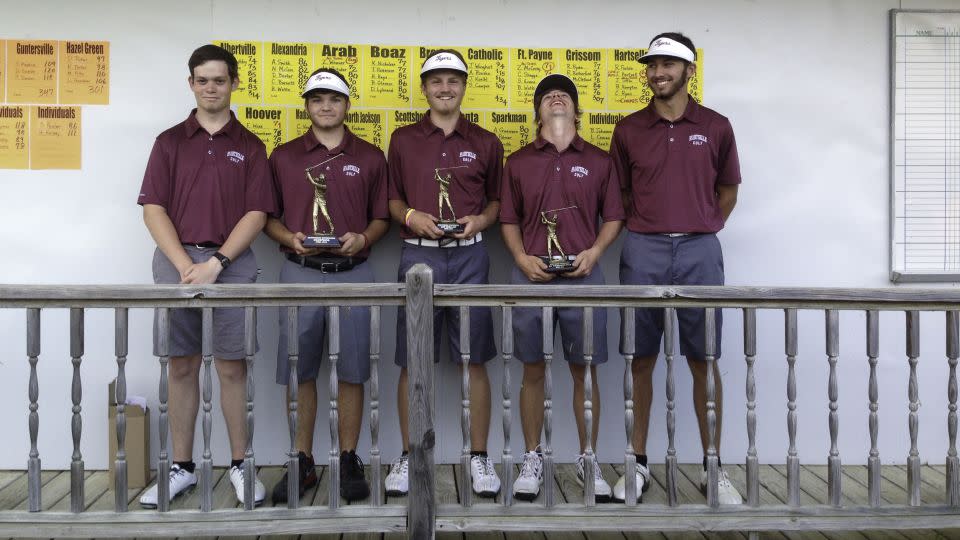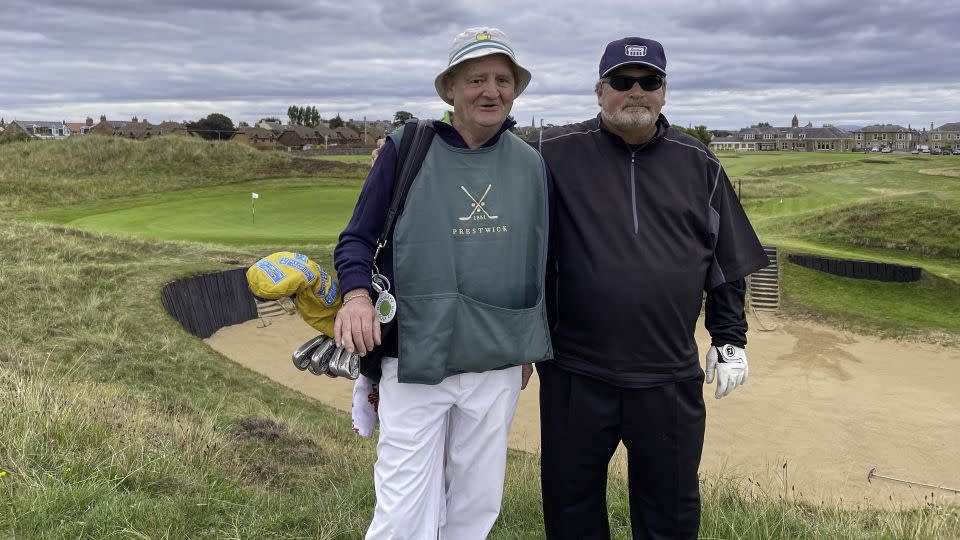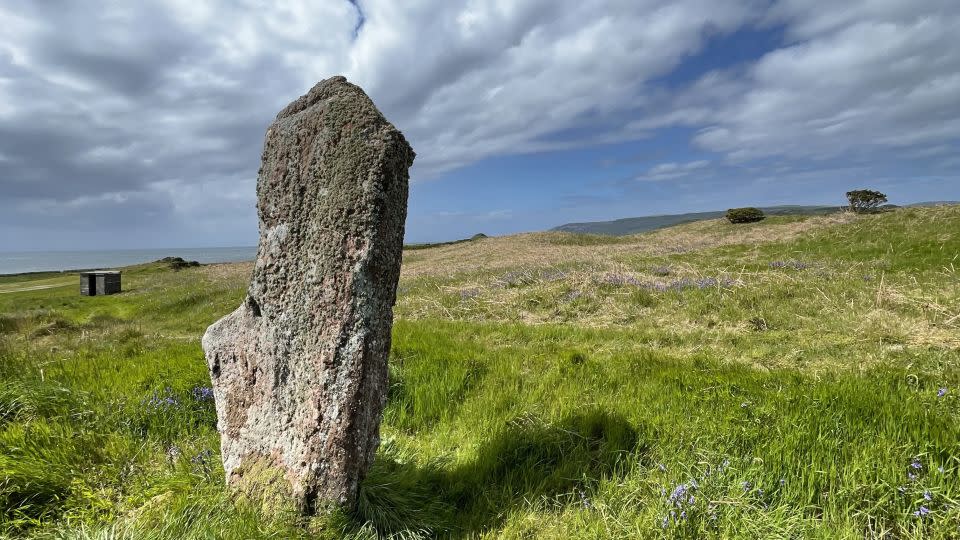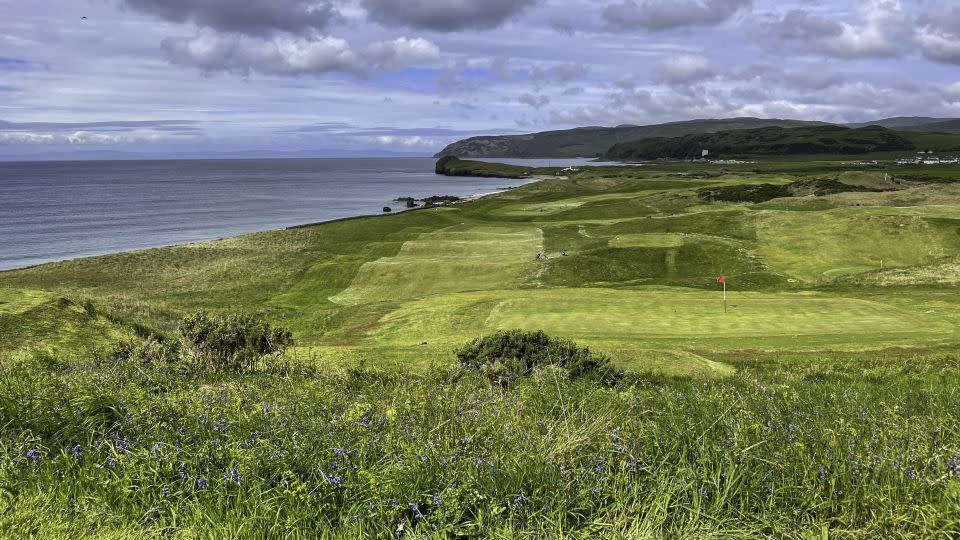Losing his young son to a drug overdose left him broken. A ‘sacred’ trip to Scotland helped him heal
Highland winds lashing his face, architect Jim Hartsell was a long way from his home in Alabama.
Alone, utterly drained both physically and emotionally, he was about to do something he had never done before — abandon a round at a Scottish golf course.
As Hartsell turned and began the solitary trudge back to the clubhouse at Wick Golf Club, a voice stopped him in his tracks.
“Don’t quit, Dad.”
The sound of his son, the youngest of three, was as real and tangible as the last remaining ball tucked away in his pocket and yet, it could not be. Three months earlier, in May 2021, Jordan Hartsell had died of an accidental drug overdose. One of the most talented junior golfers in the state, he was just 21 years old.
Of the endless questions thrown up for Hartsell by an incomprehensible loss, one loomed above the rest; how could he continue?
If there were any answers, he hoped he would find them on a trip to his spiritual home, Scotland.

Love and loss
Having thrown himself into finishing his first book in the wake of his son’s passing, Hartsell’s motivation for the journey was strictly remedial. But it led to another book — “When Revelation Comes,” published in November 2022.
Equal parts heart-wrenching and heart-warming, the account of a grieving father’s quest for peace sought across the sprawling links golf courses of Scotland is told in vivid detail.
“The death of a child hijacks your memories,” he writes. “I had thousands of photographs and videos of my son’s years of playing golf: smiling with his friends, holding trophies, with his grandfather or me … All the memories that had been my greatest source of pride and joy now caused distress.”
For the Hartsells, golf was more than just a pastime; it had helped bond three generations of the family, and a journey to Scotland structured around the sport could hopefully serve to reclaim those memories.
“The trip really saved me in a lot of ways,” Hartsell told CNN.
“I just didn’t know what to do. I could hardly get out of bed … I really couldn’t work but I tried, and then I just had this idea, ‘Maybe if I get away and go see these things that I love, it’ll help me.’”
To say Hartsell loves Scotland is something of an understatement. Infatuated ever since watching the British Open Championship at Turnberry on TV in 1977 — the iconic “Duel in the Sun” waged between Tom Watson and Jack Nicklaus — Hartsell’s 2021 trip marked his seventh to the country.
A first trip with his father in 1994, playing the famous Open venues like the St. Andrew’s Old Course and Carnoustie as well as a host of lesser-known venues along the west coast, proved to be a seminal moment in Hartsell’s life. To date, he has played over 130 of the 500 plus courses dotted across the country, many of his most beloved — like Dunaverty on the tip of the Kintyre peninsula — stumbled across following the suggestion of a stranger.

“There’s always something new to find,” Hartsell said. “If I could, I would move to Southend or Kintyre in a second.”
Beyond the golf, he’s fallen in love with Scotland’s food, history and culture. From the “perfect meal” of soup and a ham and cheese toastie to the Callanish Stones on the Isle of Lewis and the myriad ancient forts and castles scattered across the countryside, the book was as much a love letter to the country as it was to its iconic courses.
Above all, though, it was about Scottish people, and a way of life sorely needed in the wake of tragedy.
“They have an empathy that is hard to explain,” Hartsell said.
“They’re very worried about someone having a good time when they’re there, or if somebody doesn’t know how to get from one place to another — whatever the problem may be, they just seem to go out of their way to help people.
“I’ve always thought … their history, going way back, it’s painful at times. I just think it’s given them a sympathy for people … it’s ingrained in their culture. The generosity of the people is just amazing and it’s one of the things that’s really, honestly, helped me get through these last few years.”

Revelation
Several Scots in particular played leading roles in Hartsell’s trip, most notably Robbie Wilson, a Lochgilphead native he first met through X, the social media platform formerly known as Twitter, who housed and accompanied him for much of his visit.
It was Wilson who sat alongside him when, as the book title alludes, revelation came. Grief had hovered at the periphery throughout Hartsell’s time in Scotland, often flaring from the most innocuous of activities; identifying local plants using an app that Jordan had introduced him to, or seeing a father and son playing soccer on a beach.
Breakthroughs were made through similarly random events: a transcendent twilight encounter with a deer in Ballachulish that Hartsell took as a sign from his son — “for the first time since Jordan’s death, I felt, for just those few moments, that maybe there was a reason to keep going” — and that moment he headed back to the clubhouse at Wick.
“I heard Jordan’s voice in my head,” Hartsell recalled. “So I said, ‘Ok, I’ve never walked off a golf course in Scotland, I’ve gotten so much more respect for these places than that — Jordan’s telling me not to quit here.’”

Enlightenment arrived at Hartsell’s favorite resting spot, a bench next to the 11th tee at Dunaverty’s highest point, Mount Zion. Sat next to Wilson on what was their final round of the trip, gazing out over the Irish Sea, Hartsell was hit by a wave of “uncontrollable” emotion.
“This is when the revelation came,” wrote Hartsell. “It suddenly became clear to me that I had to keep going for Jonathan and Jake [his other sons], for my new grandson Otis, for my dad, for my wife. Grief is a solitary pursuit, but only family can comprehend the sheer magnitude and pain of the loss. They still needed me, and that should be enough.
“I had to reclaim the memories of my son. They were not suddenly invalid and wrong because he was gone … My time in Scotland … had helped me understand that it was okay to grieve, but you had to find a way to continue. The Scottish sense of practicality, hard-earned through a history of suffering, demanded that. The Scottish sense of empathy and quiet understanding, earned in the same fashion, had helped me find a way to keep living.”

Hartsell returned to Scotland the next year, on the anniversary of Jordan’s death, and has since booked a ninth visit, headlined by a long-awaited trip with middle son Jake to The Open Championship, the 152nd edition at Royal Troon, in July.
His time is filled by work, his writing, golf with his sons and father — still a regular on the course into his 80s — and, increasingly since the book’s publication, responding to thousands of messages. Senders vary from those who have suffered a similar loss, to those chasing travel tips for Scotland, and Hartsell welcomes them all.
“It makes me happy,” he said. “I wanted the story to not just be about golf … it was just the framework to tell the story.
“We’ve each only got a certain amount of time. Jordan was 21 and this was an accident and it shouldn’t have happened. It makes you think, really, that what’s important is family, spending time with your friends and trying to do good things for people. That’s what I’ve tried to do to try and keep going.”
For more CNN news and newsletters create an account at CNN.com

